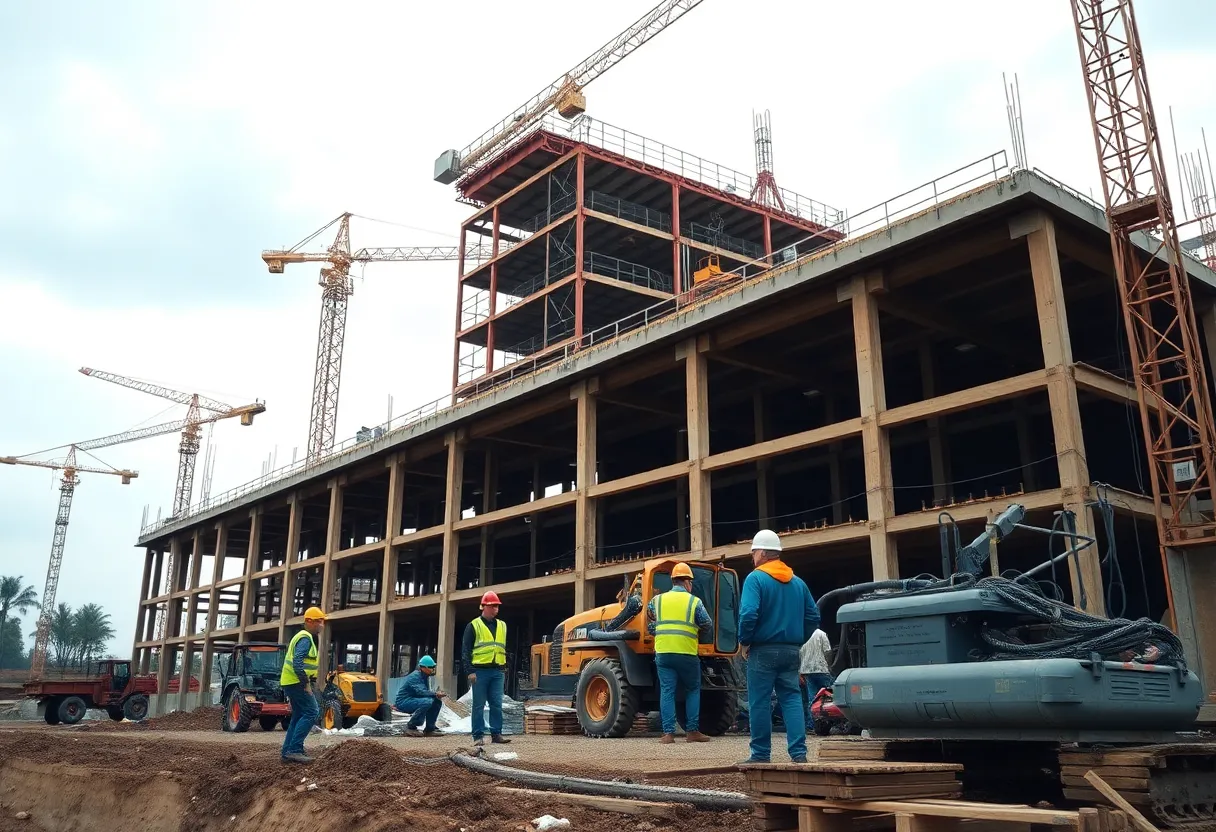News Summary
The construction and real estate industry in Chicago is facing significant challenges, including rising inflation, labor shortages, and fragile supply chains. With economic uncertainty affecting project viability, firms are being forced to navigate cash flow issues and increased cybersecurity threats. Despite these hurdles, opportunities persist in niche markets like data centers and urban regeneration. Adopting flexible strategies and investing in technology become crucial for firms aiming to remain competitive and ensure project success in a turbulent economic climate.
City: Chicago
The construction and real estate sector in Chicago is currently facing a convergence of significant challenges that are testing the industry’s resilience and adaptability. With inflation rising and uncertainty surrounding interest rates, many stakeholders are encountering difficulties in delivering projects on time and within budget. Other pressing issues include fragile supply chains, increasing geopolitical tensions, and heightened commodity price volatility for crucial construction materials.
According to Aon’s Global Risk Management Survey, leaders in the construction and real estate sectors are grappling with critical challenges such as economic slowdowns, liquidity concerns, cash flow risks, and increasing cyber threats. As investment decision-making becomes paralyzed by geopolitical instability and persistent inflation, many firms are forced to postpone or even cancel projects, further straining the industry.
Labor shortages continue to compound these difficulties, with a significant share of skilled workers nearing retirement. This trend has created an experience vacuum that is felt even more acutely in an industry that demands both physical and digital competencies. The ongoing skills gap amplifies the challenges posed by rising competition, as new entrants flood the market driven by infrastructure investments, making timely and budget-compliant project deliveries more difficult.
Identified Risks Impacting Project Viability
To effectively deal with the multifaceted risks affecting project viability, firms are advised to stress-test scenarios that could potentially disrupt operations. Traditional risk management frameworks often struggle in this complex landscape, where interconnected risks present unique challenges. This has resulted in heightened concerns regarding cash flow and liquidity, as contractors face delayed payments and unexpected cost overruns.
As the industry rapidly embraces digitalization, the threat of cyberattacks has emerged as a central concern. Job sites are frequently unprepared to defend against ransomware and supply chain attacks, primarily due to a lack of robust cybersecurity measures. Investments in cyber hygiene, endpoint protection, and enhanced supply chain visibility are crucial in reducing vulnerabilities.
Strategies for Navigating Economic Uncertainty
Even amid these challenges, opportunities for growth remain within certain niches of the market. Areas such as data centers, energy transition infrastructure, and urban regeneration projects are becoming increasingly attractive for investment. To maintain momentum in a downturn, industry leaders are encouraged to diversify their project portfolios and explore flexible financing options. Tools like surety bonds can provide strategic solutions that preserve working capital and guard against risks associated with insolvency.
Additionally, firms are urged to adopt flexible contracts and implement strategic purchasing strategies to lock in material prices and mitigate risks exacerbated by inflation. This approach is essential for achieving project viability and staying competitive in the current economic climate.
Future Considerations and the Role of Technology
The construction sector’s future risks include intensified market competition, evolving cyber threats, and ongoing economic uncertainty. Organizations now face the dual challenge of a labor shortage and a widening skills gap, making it crucial to position the industry as an appealing career option for new talent. Investment in employee development and advancement programs will be necessary for attracting and retaining skilled professionals.
Technology is becoming increasingly necessary for firms looking to differentiate themselves. Investments in digital tools, such as building information modeling and artificial intelligence, are helping firms navigate the complexities of modern project management successfully. For effective risk management, organizations must evolve to incorporate a comprehensive understanding of both human capital and operational risks, focusing on proactive decision-making.
Corporate culture, employee engagement, and satisfaction are critical factors affecting risk exposure and overall performance. As firms confront the complexities stemming from emerging technologies, they must be prepared to adapt their workforce dynamics and operational processes accordingly, ensuring they remain relevant in an ever-changing landscape.
Deeper Dive: News & Info About This Topic
HERE Resources
Syracuse’s Parkside Commons to Undergo Major Redevelopment
Baltimore Ranks as Third Most Dangerous City in U.S.
Bus Driver Shortage Disrupts School Transportation in Northwest Ohio and Michigan
DPR Construction’s Build Up High School Internship Program
Clifford Construction Expands into Commercial Projects in Kannapolis
Merced Businesses Struggling Amid Ongoing Construction
Governor Wes Moore Restructures Baltimore Liquor Board
Baltimore Community Demands Justice After Death of Dontae Melton Jr.
Hudson School Board Considers Closure of Elementary Schools
OTH Hotels Resorts Expands with New Hilton Property in Baltimore
Additional Resources
- Aon: How Human Capital Data Enhances Risk Management
- Investopedia: Human Capital
- Risk & Insurance: Human Capital Investment
- PR Newswire: Aon Appoints Andy Marcell as CEO
- J.P. Morgan: Importance of Human Capital Management
- Wikipedia: Human Capital
- Google Search: Construction Risk Management
- Google Scholar: Human Capital in Construction
- Encyclopedia Britannica: Risk Management
- Google News: Cybersecurity in Construction
Author: STAFF HERE BALTIMORE WRITER
The BALTIMORE STAFF WRITER represents the experienced team at HEREBaltimore.com, your go-to source for actionable local news and information in Baltimore, Baltimore County, and beyond. Specializing in "news you can use," we cover essential topics like product reviews for personal and business needs, local business directories, politics, real estate trends, neighborhood insights, and state news affecting the area—with deep expertise drawn from years of dedicated reporting and strong community input, including local press releases and business updates. We deliver top reporting on high-value events such as the Baltimore Book Festival, Preakness Stakes, and Artscape. Our coverage extends to key organizations like the Baltimore Chamber of Commerce and Visit Baltimore, plus leading businesses in shipping and healthcare that power the local economy such as the Port of Baltimore and Johns Hopkins Medicine. As part of the broader HERE network, we provide comprehensive, credible insights into Maryland's dynamic landscape.





